|

Rowing Home the Schoof-Stuff
1886
The Old Order and the New
P. H. Emerson and Photography
1885-1895
_______________________
The Past is the Present
Marianne Moore
If external action is effete
and rhyme is outmoded,
I shall revert to you,
Habakkuk, as when in a Bible class
the teacher was speaking of unrhymed verse.
He said - and I think I repeat his exact words -
"Hebrew poetry is prose
with a sort of heightened consciousness." Ecstasy affords
the occasion and expediency determines the form.

Marianne Moore
b. Nov. 15, 1887
with her mother
photographed by Cecil Beaton
The Paper Nautilus
Marianne Moore
For authorities whose hopes
are shaped by mercenaries?
Writers entrapped by
teatime fame and by
commuters' comforts? Not for these
the paper nautilus
constructs her thin glass shell.
Giving her perishable
souvenir of hope, a dull
white outside and smooth-
edged inner surface
glossy as the sea, the watchful
maker of it guards it
day and night; she scarcely
eats until the eggs are hatched.
Buried eight-fold in her eight
arms, for she is in
a sense a devil-
fish, her glass ram'shorn-cradled freight
is hid but is not crushed;
...(more)
_______________________
That Obscure Object of Desire
Helen DeWitt
(....)
Is it, then, genuinely irrational behavior which would, like so much genuinely irrational behavior, be intuitively comprehensible to most, perhaps all, hypothetical observers? Genuinely irrational but highly unusual behavior reflecting preferences which would mark him out as eccentric, perhaps mad? Apparently irrational but ultimately rational behavior, perhaps some sort of effective hunter- gatherer heuristics procedure, which would be widely recognized as such? Ultimately rational behavior which would, like so much rational behavior, be radically incomprehensible to the average observer?
Billions of purchases cluster around 100% comprehensibility. 20%, perhaps a few hundred thousand. Finnegans Wake. Tender Buttons. 0%, 1.
Humans have the capacity to assign meaning to behavior not previously encountered. Not all outlying behaviors are meaningless.
Purchase of 100% comprehensible books comprehensible to some but not all non-book buyers. Purchase of FW/TB comprehensible to some but not all non-FW/ TB buyers. Purchase of incomprehensible book possibly comprehensible to some non- incomprehensible-book buyers.
His memory of the translation he read is a contributing factor. Incomprehensibility would have come cheaper in a copy of Fanatik(0.85). He has paid approximately 1800% more for the unreadable text of a book he knows. This has a veneer of sense. The surest sign of superstition.
...(more)
_______________________
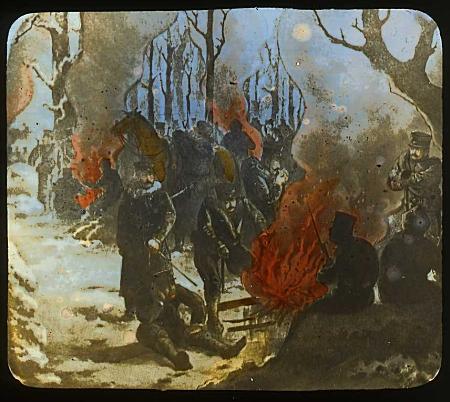
Forest Camp
Magic Lantern Slides Collection
The Asia Collection
Hamilton Library
University of Hawai'i - Manoa
_______________________
Buddha On The Bounty
Ted Berrigan
b. Nov.15, 1934
for Merrill Gilfillan
"A little loving can solve a lot of things"
She locates two spatial equivalents in
The same time continuum. "You are lovely. I
am lame." "Now it's me." "If a man is in
Solitude, the world is translated, my world
& wings sprout from the shoulders of 'The Slave' "
Yeah. I like the fiery butterfly puzzles
Of this pilgrimage toward clarities
Of great mud intelligence & feeling.
"The Elephant is the wisest of all animals
The only one who remembers his former lives
& he remains motionless for long periods of time
Meditating thereon." I'm not here, now,
& it is good, absence.
_______________________
The Collagist
Issue Twenty-Eight
November 2011
dzanc books
American Literature
Ryan Ridge
(....)
Go ahead. It's okay. I'm wearing an astronaut helmet and a Melville costume. Go ahead and fire me from the Western Cannon! I will soar over the university towns, across the divergent readerships, and into the lost libraries of the sea.
(....)
What does it mean to be a man of letters in an era where no one writes letters anymore?
Someday they will say of our writers: He was a man of emails. She was a woman of tweets.
(....)
Tao Lin is the perfect spokesperson for today's American literature. The fact that he's so divisive can only be attributed to the outdatedness of our Aristotelian mindsets. For instance, the notion that we still look at maps and see either blue or red.
Because even the bluest poet in the reddest state is still prone to the purplest of prose.
Because the internet blog of the future exists today.
Because it's hard to find American literature in the comment sections on the internet, but sometimes you'll find it in the articles above.
As above, so below.
The cyber-Hermeticism of American literature in action....(more)
_______________________
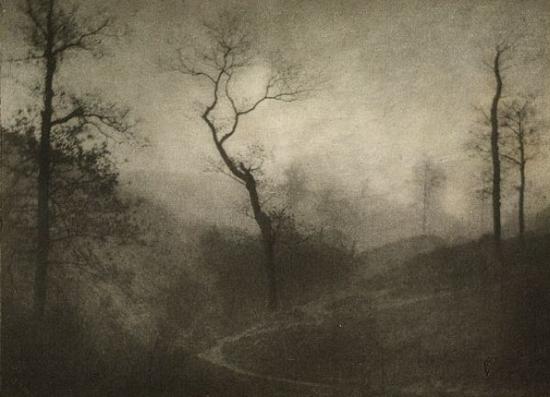
Crepuscule d'Hiver
Gustave Marissiaux
1908
Photogravures
curated by Photo Tractatus
flickr
_______________________
Logos
a journal of modern society & culture
2011: vol. 10, issue 4
Reflections on the Occupy Wall Street Movement
With Essays by:
Stanley Aronowitz, Benjamin Barber, Stephen Eric Bronner, Steve Early. Bill Fletcher, Kurt Jacobsen, Jeff Madrick, Ian Williams, Rick Wolff, Richard Wolin, Gregory Zucker
_______________________
The CBC Massey Lectures
celebrating fifty years
... the CBC Massey Lectures are the product of a collaboration of three partners--CBC Radio, the House of Anansi Press, and Massey College in the University of Toronto. For most of their history, the Massey Lectures were recorded within the austere confines of a radio studio in Toronto. But since 2002, they have been delivered each fall before large audiences on university campuses in cities across Canada. The lectures are broadcast each November on CBC Radio One, are streamed worldwide on the internet and are available as podcasts and audio CDs. The lectures are published as a trade paperback that garners international attention and usually makes the best seller lists. The CBC Massey Lectures have established their place as a Canadian institution and an annual highlight of our national intellectual life.
_______________________

photo - mw_______________________
Desert Islands and Other Texts. 1953-1974. [pdf]
Gilles Deleuze
Translated by Michael Taormina
... everything that geography has told us about the two kinds of islands, the imagination knew already on its own and in another way. The élan that draws humans toward islands extends the double movement that produces islands in themselves. Dreaming of islands - whether with joy or in fear, it doesn't matter - is dreaming of pulling away, of being already separate, far from any continent, of being lost and alone - or it is dreaming of starting from scratch, recreating, beginning anew. (....) It is no longer the island that is separated from the continent, it is humans who find themselves separated from the world when on an island. It is no longer the island that is created from the bowels of the earth through the liquid depths, it is humans who create the world anew from the island and on the waters. Humans thus take up for themselves both movements of the island and are able to do so on an island that, precisely, lacks one kind of movement: humans can drift toward an island that is nonetheless originary, and they can create on an island that has merely drifted away. On closer inspection, we find here a new reason for every island to be and remain in theory deserted.
An island doesn't stop being deserted simply because it is inhabited. ....
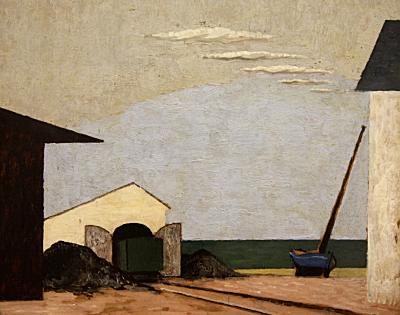
La Gare de Kerity
Louis Marcoussis
b. Nov. 14, 1883
_______________________
Passage over Water
Robert Duncan
We have gone out in boats upon the sea at night,
lost, and the vast waters close traps of fear about us.
The boats are driven apart, and we are alone at last
under the incalculable sky, listless, diseased with stars.
Let the oars be idle, my love, and forget at this time
our love like a knife between us
defining the boundaries that we can never cross
nor destroy as we drift into the heart of our dream,
cutting the silence, slyly, the bitter rain in our mouths
and the dark wound closed in behind us.
Forget depth-bombs, death and promises we made,
gardens laid waste, and, over the wastelands westward,
the rooms where we had come together bombd.
But even as we leave, your love turns back. I feel
your absence like the ringing of bells silenced. And salt
over your eyes and the scales of salt between us. Now,
you pass with ease into the destructive world.
There is a dry crash of cement. The light fails,
falls into the ruins of cities upon the distant shore
and within the indestructible night I am alone.
_______________________

Fragile balance
photography of Misha Maslennikov
Studiolum
Poemas del rķo Wang
_______________________
On Noise and Racket
Arthur Schopenhauer
Translated by Aaron Kerner
In 1937, a 31-year-old Samuel Beckett, convalescing from a spell of "gastric flu (so called)" and his first completed novel, Murphy, wrote to Thomas McGreevy: "When I was ill I found the only thing I could read was Schopenhauer. Everything else I tried only confirmed the feeling of sickness. It was very curious. Like suddenly a window opened on a fug. I always knew he was one of the ones that mattered most to me . . . a philosopher that can be read like a poet, with an entire indifference to the a priori forms of verification. Although it is a fact that judged by them his generalisation shows fewer cracks than most generalisations." The following mass of cracked and flagrant generalization is excerpted from the great post-Kantian pessimist's 1851 collection of essays, Parerga and Paralipomena—two volumes much concerned with human suffering and its sources, among them: women, bad poetry, and noise.
...(more)
Context N°23dalkey archive press_______________________
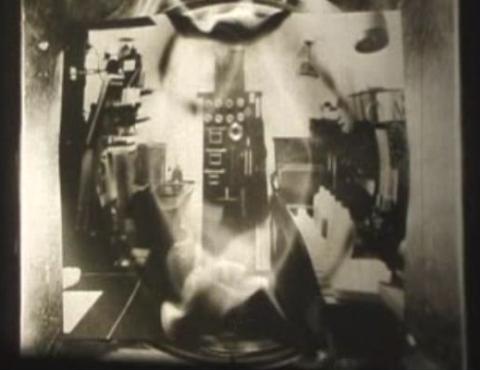
Nostalgia
Hollis Frampton
1971
ubu film
"In his 1971 short film, (nostalgia), American artist and writer Hollis Frampton oveturned the conventional narrative roles of words and images. In his account of an artists's transformation from photographer to filmmaker, Frampton burns photographs he had taken and selected from his past along with one found photograph. A calm voice tells a story about an image, but the story is about the following image, not the one shown. Confounding comprehension still further, the narration begins and ends during the photograph's combustion; smoke and ashes get in our eyes while we are trying to make sense of the image and the narration--trying to remember the story that fits the image, trying to remember the image that fits the story..."
12 films by Hollis Framptonmade between 1966 and 1979 ubu film
_______________________
Begins
Gillian Conoley
conjunctions
(....)
if the middle range would have me now
would permit me
a particularly Blakean protein
lodged too deep in my psyche and that’s
what is wrong with me
if when I look out I am turning on that subjectivity
geodesic and unlikely
hungry the narcissistic ego would find a way
to get out of the pathological books
I love dancing because it makes me feel
strong and beautiful
and made of muscle and air
it is a weedy, unmanicured trail
...(more)
Gillian Conoley: three poemsjacket 16
Three poems
Gillian Conoley
Electronic Poetry Review #3
Gillian Conoley at the Poetry Foundation
_______________________
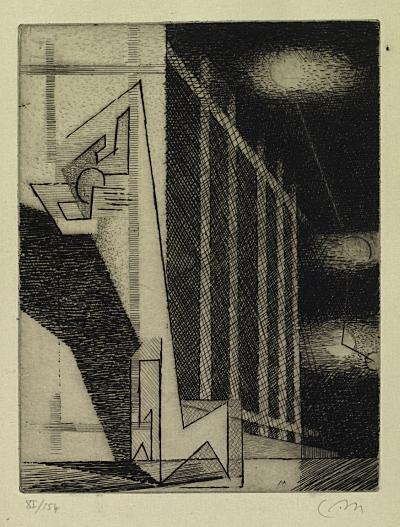
Several moons
From the Aurélia series
Louis Marcoussis
_______________________
A Grammar of the Multitude
For an Analysis of Contemporary Forms of Life
Paulo Virno
Translated from the Italian by Isabella Bertoletti, James Cascaito, Andrea Casson
full text
Foreword: We, the Multitude
Sylvčre Lotringer
Paolo Virno's A Grammar of the Multitude is a short book, but it casts a very long shadow. Behind it looms the entire history of the labor movement and its heretical wing, Italian "workerism" (operaismo), which rethought Marxism in light of the struggles of the 1960s and 1970s. For the most part, though, it looks forward. Abstract intelligence and immaterial signs have become the major productive force in the "post-Fordist" economy we are living in and they are deeply affecting contemporary structures and mentalities. Virno's essay examines the increased mobility and versatility of the new labor force whose work-time now virtually extends to their entire life. The "multitude" is the kind of subjective configuration that this radical change is liberating, raising the political question of what we are capable of.
(....)
"It is doubtful that the joys of capitalism are enough to liberate the people," Deleuze wrote in 1991.14 "Those who keep invoking the bloody failure of socialism don't seem to consider as a failure the present state of the global capitalist market, with the bloody inequalities it involves, the populations pushed off the market, etc. It's been a long time since the American `revolution' has failed, even before the Soviet's did. The situations and revolutionary attempts are generated by capitalism itself and they are not going to disappear." Capitalism itself is revolutionary because it keeps fomenting inequality and provoking unrest. It also keeps providing its own kind of "communism" both as a vaccine, preventing further escalation, and an incentive to go beyond its own limitations. The multitude responds to both and can go either way, absorbing the shocks or multiplying the fractures that will occur in unpredictable ways.
A specter haunts the world and it is the specter of capital...... _______________________
Marie Antoinette's neoliberalism
Roger Gathman
Limited, Inc.
(....)
There is a specter haunting the developed countries – the specter of the increase of exploitation. Wages are continuing to fall below the increase in productivity, and this means (sound the trumpets, please): you get one of those garden variety shortfalls of demand, and oversupply of goods, that so puzzles your elite capitalist type. He scratches his head, and then he dreams up his solution to the problem: why not reward the rich even more money, and take away the package of compensation (in the form of public goods) from the rest of the population? Somehow, a solution in which the elites engross even more of the collective wealth goes over well with the elites. They start writing grave articles about it. And sometimes they just throw together a mishmash of contradictions and claim that it is a program for the ages – thus, the current fad for expansionary contraction, which, like virgin births and perpetual motion machines, is proof that the verbal is triumphantly infinite, while the material is sadly limited to what can actually happen.
The poetic origin of the expansionary contraction comes from that mythical phrase of Marie Antoinette’s, let them eat cake. The EU bureaucrats have iced that phrase nicely with econo-speak, but strip off the icing and it’s the same old cake....(more)
_______________________
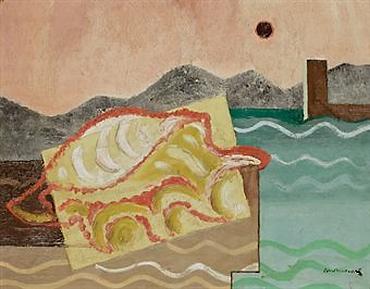
Souvenir d'Oslo
Louis Marcoussis
1927
_______________________
Semblance and Event: Activist Philosophy and the Occurent Arts
Brian Massumi
MIT Press, 2011
google books
mediafire pdf
from the introduction
(....)This book in large part works from practices that according to traditional classifying schemes would fall into the domain of art or philosophy. But it does this to open art and philosophy to each other, and in a way that opens their opening onto to each other out into a wider activist understanding of the relational-qualitative processes moving through them. The ultimate speculative-pragmatic wager of the book is that if this opening-out succeeds, subsequent takings-up of its tendency might open out of its own practice, that of writing, into other activist arenas in the more usual sense of the word. If the book can be considered to have one central concern, it is this: the politicality of process, in whatever initial midst. The politicality of a pulse of process is the manner of potential it passes on for self-creative successor effect.
(....) _______________________
Digitize Me, Visualize Me, Search Me
Open Science and its Discontents
edited by Gary Hall
living books
Living Books About Life is a collaboration between Open Humanities Press and three academic institutions: Coventry University, Goldsmiths, University of London, and the University of Kent.
_______________________
"Since there are so many people who are depressed - and I maintain that the cause for much of this depression is social and political - then converting that depression into a political anger is an urgent political project....Anti-depressants and therapy are the opium of the masses now." - Mark Fisher
Capitalist Realism: An Interview with Mark Fishertranscript here
Capitalist Realism: Is There No AlternativeMark Fisher via Mark Thwaite
Mark Fisher blogs at k-punk
_______________________
Childhood’s Retreat
Robert Duncan
It’s in the perilous boughs of the tree
out of blue sky the wind
sings loudest surrounding me.
And solitude, a wild solitude
’s reveald, fearfully, high I’d climb
into the shaking uncertainties,
part out of longing, part daring my self,
part to see that
widening of the world, part
to find my own, my secret
hiding sense and place, where from afar
all voices and scenes come back
—the barking of a dog, autumnal burnings,
far calls, close calls— the boy I was
calls out to me
here the man where I am “Look!
I’ve been where you
most fear to be.”
_______________________
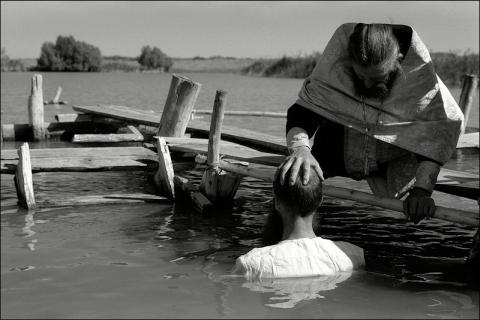
Misha Maslennikov
_______________________
(....)
Often I am permitted to return to a meadow
as if it were a given property of the mind
that certain bounds hold against chaos,
that is a place of first permission,
everlasting omen of what is.
-
Robert Duncan, Often I Am Permitted to Return to a Meadow
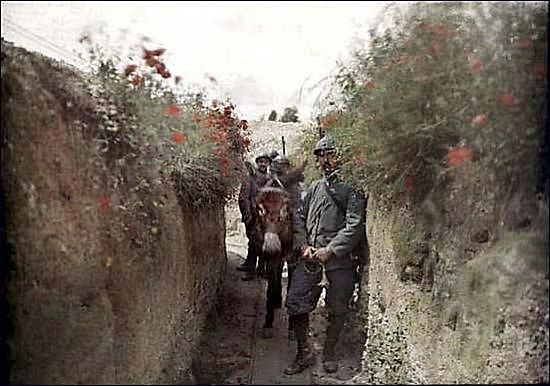
Trench With Poppies
French army patrol
1916
The Heritage of the Great War
_______________________
The Will of Achilles
Robert Kelly
conjunctions
1.
But under the rain
a different thing. Vine leaves
Achilles sees, inconsequent
myrtles. There is no end
to weather. The gods are done with him.
2.
If prowess were the answer—
but men die anyhow,
skilful or cack-handed
eventually go down.
Some say it is a road.
Some say it is nowhere at all.
(....)
15.
No time for questions.
Clouds here and there
padding the far sun, wind lift,
hint of rain. The smell of things.
On such days the body knows
something’s on its way.
Already there are more trees
than he had names for—
each thing comes to help me
but the last one kills
he thought. He watched the sky:
a nice girl sweeping the floor.
Be thorough in it, anything,
he thought, and that will do.
We comfort ourselves with stories,
wise remarks, analogies, gods.
Surprised, he came aware
the clouds did not move at all.
...(more)
Robert Kelly interviewed by Mark Thwaite(20/08/2006)
... it’s about listening. I have come to believe (and I keep saying this, so I’m sure you’ve heard it before) that every language is a second language, language itself is a second language. We remember childhood, the vague excitement of heard words, their colors, their shapes in our ears we tried to taste in our mouths, words were things then, and the system that any natural language is hadn’t gelled yet for us. (Michel Leiris is wonderful on that epoch.) We heard, and what we heard the Others saying somehow, but we didn’t know how, somehow related to, mapped onto, connected with, the other things around us, the thing things. Things that spoke to and in us with a vividness and distinctiveness, each its own. I keep trying to listen to things that way still again, things that are ‘always already’ speaking (in that famous French phrase). So one way to answer is to say that there are three phases: things and no language (earliest childhood), things and language distinct but interlinking (ordinary life and language), the words become things of their own (writing, the poem as object in a world of object, made so not by the accuracy by which it may map some prior emotional state of the ‘poet’ – that is, not by its force of representation – but by the fact, thingliness of the language itself.)
I want to write Thinglish. And when I push students in workshops, it’s towards Thinglish, the pebbled streambed that purifies the stream of language that runs over it....(more)
Robert Kelly
_______________________
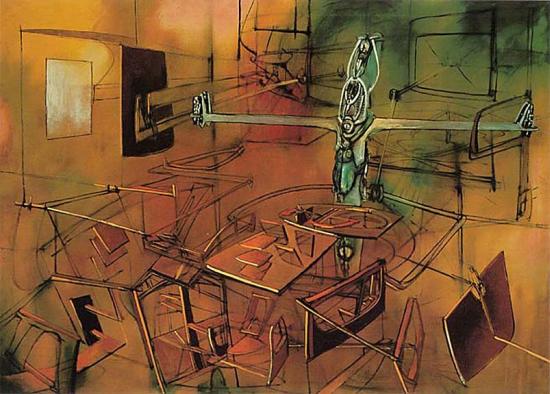
"A Grave Situation"
1946
Roberto Matta
b. Nov. 11, 1911
Psychological Morphology
Roberto Matta
_______________________
By any conventional measure, and entirely through their own fault, the Republicans have produced a field of candidates so utterly comical, so completely devoid of conventional political merit, that the field itself is strong evidence for the elimination of the Republican party. The frontrunner is a simuloid fake. The leading contender is a horndog as surprised to discover that women did not want him as he was to discover that China had The Bomb. The leading "intellectual" thinks Barack Obama "...is about as candid and accurate as Bernie Madoff in what he tells the American people" and then, of course, decries the incivility that is drowning out the important discussion we need to have about the issues facing This Great Nation. The rest of them are concerned about zygotes, black helicopters, and whatever else is simmering in the Bachmann-Paul-Santorum stewpot. And there is Jon Huntsman, the invisible former governor of Utah, reasonably sentient human, and proven non-horndog. This isn't a primary campaign field. It's a condo-board election at the Hell Country Estates.
- Charles P. Pierce
_______________________
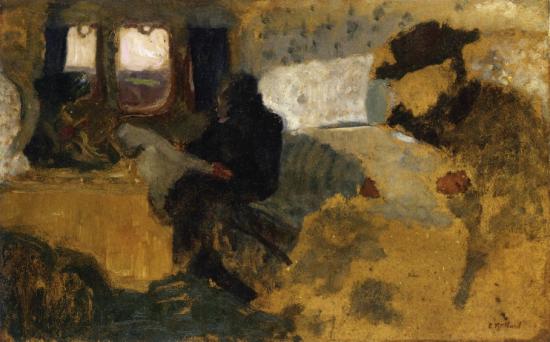
The First Class Compartment
Edouard Vuillard
b. Nov. 11, 1868
_______________________
Jeanette Winterson: Why Be Happy When You Could Be Normal?
review by John Self
(....)The three elements in the book – love, literature, life in the world – are ultimately inseparable. Mrs Winterson “read the Bible as though it had just been written – and perhaps it was like that for her. I got a sense early on that the power of a text is not time-bound. The words go on doing their work.” Jeanette not only explains but shows how her childhood informed her fiction, including the lack of straightforward narrative which she attributes in part to her own life’s lack of narrative. ”That’s not method; that’s me.” She gives new life to the textual refrains from her books which ring like mantras for those who know her work well....(more)
_______________________
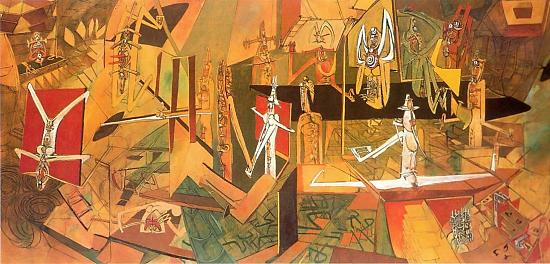
"Être avec"
Roberto Matta
1945
_______________________
Christian Soldier at 60 on Veterans Day
Stan Goff
Feral Scholar
(....)
So let’s get this straight. Veterans Day is not a celebration of actual veterans — who are to diverse to characterize; Veterans Day is a High Holy Day of our nationalist religion. It is a proliferation of flags, a mass genuflection before the altar of the late modern Rome.
And our ideas about masculinity make us men particularly susceptible to this idolatry.
The soldier is the epitome of male — the guy who will visit death and destruction on the enemy, the guy who will take the risks, the guy who will put his hands in the gore (so we don’t have to). The solider will die “for his country,” but just as importantly, he will kill for his country. He will conquer the enemy, those dark, vaguely threatening outsiders whose names we need never know.(....)
Veterans Day is a dishonest holiday, because in public we talk about sacrifice and dying for one’s country, but we go behind closed doors with the boys to celebrate the juicier stuff: the war stories with the body counts, the counting of kills, the trophies, the names we used to dehumanize them – Japs, krauts, gooks, slopes, hajjis. And this more visceral remembrance, this remembrance of eroticized violence, this celebration of conquest-masculinity, constitute the steaming entrails of nationalism....(more)
_______________________
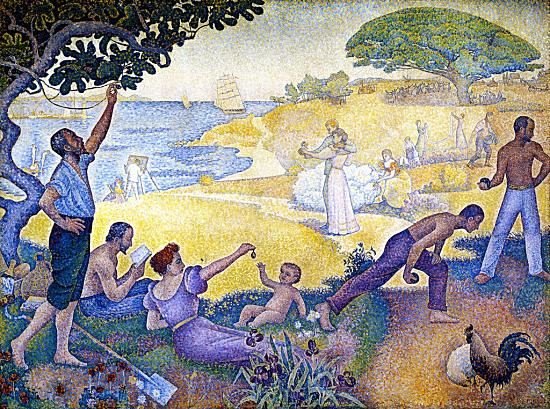
In the Time of Harmony
Paul Signac
b. Nov. 11, 1863

photo - mw
_______________________
Hand to Hand Combat
Richard Krech
It comes down to things
you can hold in your hand.
Your head, for example
or the objects you encounter
in your daily routines.
"You should know that concept
like a room you know
with its furniture
& be comfortable with it" she said.
Making things personal
so we can pick them up
understand them and move our lives
in the direction of progress we want.
Using objects to get beyond them,
the constancy of change & movement
the only fixed star.
The horizon approaching.
12 or 20 questions (second series) with Richard Krech
rob mclennan
_______________________
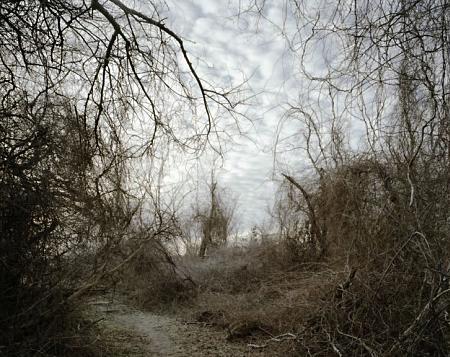
Brian Kaplan
_______________________
I Remember There Was a Hill
Jon McGregor
There was a hill, and on the hill there was a road. The road was narrow and straight and it went straight up the side of the hill. The road was broken, with ruts, and holes, and streaks of mud where tractors or tracked vehicles must have turned in and out of the fields on either side. The road was lined with poplar trees, and hawthorn hedges, and then as the road flattened out the hedges gave way to stone walls, and brick walls, and the low fences of front gardens, the front gardens of the houses that made up the village that sat like a fortress at the top of the hill. And in that village there was no green nor park nor pub nor church nor school nor shop; only the two dozen houses set back from the road, none of the houses looking out towards the sea but all turned inwards facing the road, the doors all closed and the windows all closed and the curtains all closed and no one tending their roses or mowing their lawns or mending their roofs or painting their window-frames, and no one chasing a ball or walking a dog or passing the time of day or taking a bike from a shed or hanging out laundry or washing a car or getting into a car and driving out on to the road to make their way down the hill. No barking dogs. No hum of distant lawnmower, nor rumble of tractor. No sudden cracking sounds of guns. No music or drums. No marching feet. No posters taped to telegraph poles which told of flower shows or village fetes or meetings of the neighbourhood watch. No parish noticeboard. No markings on the road, no signs noting entry to the village and asking visitors to drive with care. No signs displaying the village name, nor the year the prize for Best Kept Village was won, nor the name of the village's foreign-sounding twin. There was a phone-box, beside the road, and a phone which had just started to ring....(more)
The Manchester Review_______________________
Experimental Prose and the Reconfiguration of Incestuous Bonds:
from the Grasmere Journal to Tender Buttons
Joshua Wilner
eoagh
Suppose one were to approach Dorothy Wordsworth’s Grasmere Journal as a radical complement to William’s efforts to demonstrate that “there is no essential difference between the language of poetry and the language of prose.” Suppose, that is, one were to view the pages of her journal as participating in a history of experimental prose that includes such figures as De Quincey, Baudelaire, Rimbaud, Woolf and Stein. What follows is a preliminary attempt to pursue this speculation by suggesting that the Grasmere Journal and Gertrude Stein’s Tender Buttons are situated in comparably anomalous relations to Lacan’s “law of the father,” i.e. the incest prohibition, as the guarantor of symbolic order....(more)
EOAGH 7_______________________
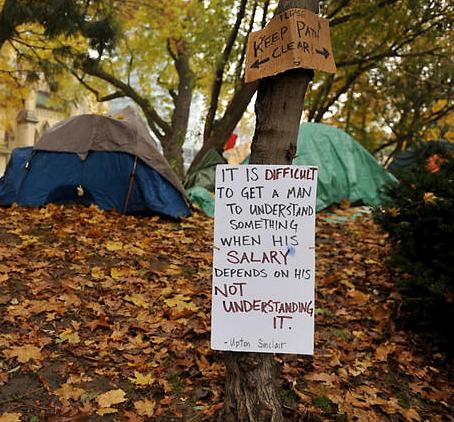
detail
photo - Keith Beaty/Toronto Star
Occupy Toronto
_______________________
A Framing Memo for Occupy Wall Street
George Lakoff
NationofChange
_______________________
Fallujah Veteran: 'I Served The 1%'
Thoughts on the role of veterans in the Occupy movement
Ross Caputi
I did not serve my country in Iraq; I served the 1%. It was on their behalf that I helped lay siege to Fallujah, helped kill thousands of civilians, helped displace hundreds of thousands of innocent people, and helped destroy an entire city. My "service" served Exxon-Mobil, Halliburton, KBR, Blackwater, and other multinational corporations in Iraq.
(....)
I was an occupier and am now an #occupier. I once served the 1%, but now try to serve the 99%. That is why I must speak up when I see the Occupy movement being led astray by the same nationalism and “Ameri-centrism,” the same thoughtless praises for U.S. troops and veterans, and the same hypocrisy that led us into the so-called “War On Terror” and the occupations of Iraq and Afghanistan.
(....)
Veterans have an important role to play in this movement, but we are not heroes because of our participation in the wars, and it is shameful for anyone to use us to appeal to patriotism; that only serves the 1%. What we have to offer this movement is a first-hand account of what the 1% has done all over the world at the expense of the 99%. We as veterans are in a better position than anyone else to fight against the dangerous beliefs that put veterans on a pedestal. It is our responsibility to speak out against injustice, no matter where it occurs in this world....(more)
_______________________
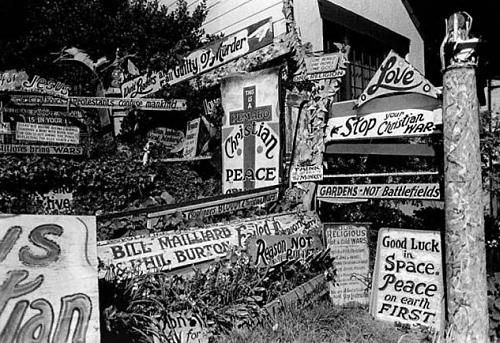
hand painted protest signs
April 24, 1971
Don Wallen:
An American Still Life
University of Washington Digital Collectionsvia
_______________________
Stealing Fire for His Own Furnaces:
Clayton Eshleman on Translation
I guess we think we are done with a translation when we can’t figure out any more questions to prod it with. We really don’t complete it; we abandon it. And of course, with both of the poets discussed here, I have returned to completed translations decades later and redone them—several times in Vallejo’s case.
_______________________
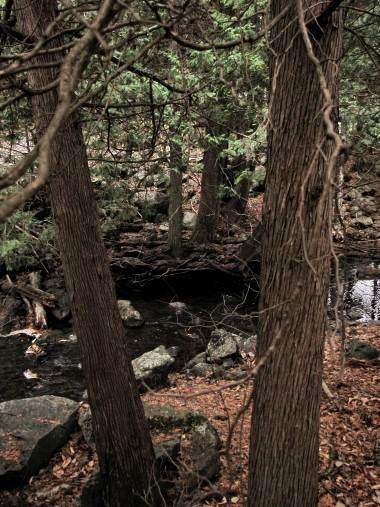
photo - mw
_______________________
Non-Western Philosophy, Part 2: the Ladder, the Museum, and the Web
Justin E. H. Smith
(....)
When philosophers try to get away from the ladder, as most agree for political reasons it is necessary to do, what they usually end up with is the museum, or perhaps, with apologies to André Malraux, the imaginary museum of philosophical multiculturalism. As the Soviets once did with the traditional costumes of their empire's ethnic minorities, those who aim to promote non-Western philosophy usually end up putting the Chinese and the Indians, and sometimes a slapped-together group they dub 'Africans' as well, in entirely separate, non-overlapping display cases, as if their philosophical traditions were just so many traditional costumes or pieces of pottery.
It is not just that ideas are harder to display in this way than are costumes or pottery, but rather that the display of national traditions in any aspect of life, whether it be material or intellectual culture, in a way that would have the observer or reader believe that this aspect is sui generis and, so to speak, aboriginal with the culture itself, is already a gross caricature of ethnic or national identity. It is a reduction of Herderianism, the proposition that each culture is irreducibly unique, to a sort of kitsch: a display of the different peoples of the world holding hands. Such display is characteristic of ulterior-motive-laden Socialist Bloc iconography of old, as well as of commercials for Coca Cola and McDonald's, along with only slightly less explicitly commercial pageants such as the opening ceremonies of the Olympics. I suppose for those purposes we can all find something heart-warming in the stylized image of an Eskimo holding hands with a Masai tribesman and a Swiss milkmaid. But when it comes to scholarship, one wants something more sophisticated....(more)
What Is 'Non-Western' Philosophy? Part One
 Railroad Landscape #21
The Machine In The Garden
Recent Photographs, 2009-2011
Jeff Brouws
Robert Mann Gallery
via
1 2 3
_______________________
Nude In Your Hot Tub, Facing The Abyss
(A Literary Manifesto After The End Of Literature And Manifestos)
Lars Iyer
the white review
(....)
Now you sit at your desk, dreaming of Literature, skimming the Wikipedia page about the ‘Novel’ as you snack on salty treats and watch cat and dog videos on your phone. You post to your blog, and you tweet the most profound things you can think to tweet, you labour over a comment about a trending topic, trying to make it meaningful. You whisper the names like a devotional, Kafka, Lautréamont, Bataille, Duras, hoping to conjure the ghost of something you scarcely understand, something preposterous and obsolete that nevertheless preoccupies your every living day. And you find yourself laughing in spite of yourself, laughing helplessly at yourself, laughing to the verge of tears. You click ‘new document’ and sit there, shaking, staring at your computer screen, and you wonder what in the world you can possibly write now.
(....)
The stalls of the marketplace provide a fascinating babble, a white noise for a well-adjusted lifetime. Let a thousand flowers bloom, etc. Perhaps the demise of Literature marks the end of a certain need. Perhaps we should give up the ghost. To what end do we require the pantomimic wraith of the počte maudit, the leering shade of Rimbaud or Lautréamont with its bottle of absinthe and its bloodshot eyes? For the pragmatic among us, the end of Literature is merely the end of a melodramatic model, a false hope that has gone the way of psychoanalysis, Marxism, punk rock and philosophy. But for the less pragmatic among us, we realise— we experience—what has been lost. Without Literature we lose Tragedy and Revolution both, and these are the two last best modalities of Hope. And when Tragedy disappears, we sink down into a gloom, a life whose vast sadness is that it is less than tragic. We crave tragedy, but where can we get it when tragedy has given way to farce? Shame and scorn are the only response now at literary readings to literary manifestos. All effort are belated now, all attempts are impostures. We know what we want to say and to hear, but our new instruments cannot hold the tune. We cannot do it again nor make it new since both of those actions have telescoped to equivalence—we are like circus clowns who cannot squeeze into their car. The words of Pessoa ring in our ears: ‘Since we are unable to extract beauty from life, we attempt at least to extract it from our incapacity to extract beauty from life.’ This is the task given us, our last, best chance.
...(more)
_______________________

photo - mw
_______________________
Arguing with Something Plato Said
Jack Collom
(for Phil Garrison and Peter Lamborn Wilson)
As ashes are the shadow of smoke,
panic is the shadow of light,
beef the shadow of grass,
love the shadow of attention,
psychology the shadow of plastic
the shadow of oil the shadow
of giant ferns the shadow of
bacteria the shadow of light’s grandmother,
rosy finch the shadow of loon,
jealousy & myth twin shadows of desire,
Europe shadow of a desert river,
idea the shadow of pain,
sleep the shadow of bread,
liquid the shadow of lust,
time the shadow of
et cetera,
logos is the shadow of what happens.
(....)
So anyway this guy imagined up God outa the play-dough
of his panicked exclusions
& then compounded the felony by trying to imitate the damn thing,
double-indemnity solipsism in the fool’s guise of cool & wise
utopian Republic! Razional! Sozialismus!
Computerized zoosphere! Hologram rain forest — a more direct
use of light.
But despite all right & crystal wings, thinking
that — “The-variability-of-the-world-has-no-more-reality-than-the-shadows-on-a-cave-wall”—
has no more reality than
Plato’s reflection in the waters
of a Theater-of-Dionysus Port-O-Let.
...(more)
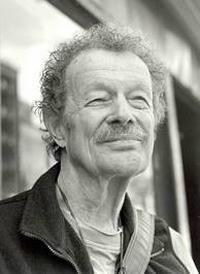
Jack Collom
(b. November 8, 1931
.....................................................
Nine from “A Poem of Miracles”
for Jack Collom on his 80th birthday
Jerome Rothenberg
(....)
4 /
The real comes first
the fancy a far second
hard to tell apart
still harder in the dark
the eye too weak
the skin still weaker
like the mind
the origin of species
hides its birth
the contours of the real
the hand feels
& the eye imagines
only later
in singular pursuit
...(more)
_______________________
Jerome Rothenberg @ 80: A Celebration
CUNY Center for the Humanities (New York)
Friday, December 9
_______________________
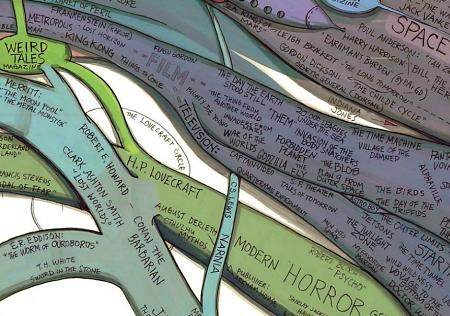
The history of science-fiction in a single image
detailvia mobylives
_______________________
My Private Life
Emmanuel Hocquard
Translated by John Latta
(....)
10. Nobody ever insists enough on the one who’s addressed. Everything is there. In my end is my beginning, Dear Thomas Stearns. Dear Mademoiselle Lynx. And the madman of an Author who reads Kierkegaard to the chickens. Necessity makes men run wry, / And hunger drives the wolf from wood, dear Ezra. My intention is the one who’s addressed.
(....)
14. Literature is a machine to produce Literature, not thinking, not criticism. In order to study, or to critique, I have no need of Literature. No more than I do philosophy. To tell the truth, for thinking, nobody needs it. I have no need of Literature for critical thinking, but I need to think critically about Literature seeing as how I’ve so imprudently fallen into it. To think critically about Literature is not a way to make it; it’s a way to remove it, to rub it out, to undo it. And, by doing so, remove it in me, undo it in me, rub a hole in the paper of my faults.
...(more)
CONTEXT N°23dalkey archive press
With Warren F. Motte, Robert Ashley, Franco Baldasso, Nicholas Birns, Giuliano Boraso, Orly Castel-Bloom, Erica Debeljak, Craig Dworkin, Kyle Gann, Karen Grumberg, Todd Hasak-Lowy, Emmanuel Hocquard, Gerhard Meier, Christine Montalbetti, Werner Morlang, Gerald Murnane, Giovanni Orelli, Boris Pahor, Arthur Schopenhauer, Asaf Schurr, Viktor Shklovsky, Roland Topor, Aglaja Veteranyi
_______________________
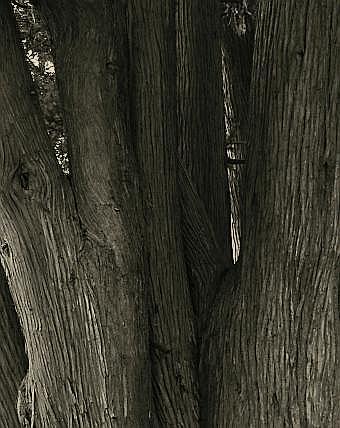
photo - mw
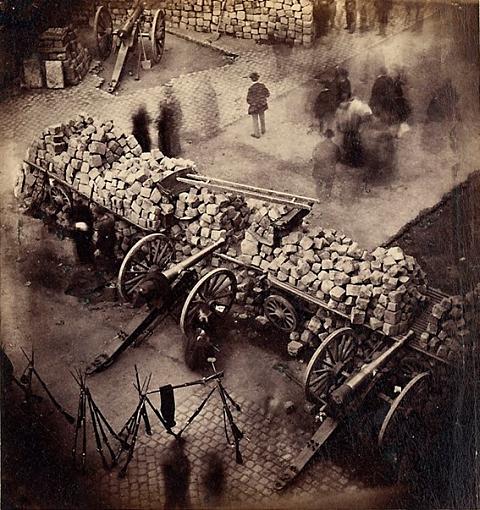
Barricades of the Commune
April 1871
Pierre-Ambrose Richebourg
1810-1893
image found here
_______________________
"On the poop deck of slave galleys it is possible, at any time and place, as we know, to sing the constellations while the convicts bend over the oars and exhaust themselves in the hold; it is always possible to record the social conversation that takes place on the benches of the amphitheater while the lion is crunching the victim. And it is very hard to make any objections to the art that has known such success in the past. But things have changed somewhat, and the number of convicts and martyrs has increased amazingly over the surface of the globe. In the face of so much suffering, if art insists on being a luxury, it will also be a lie."
-
Albert Camus (b.Nov. 7, 1913), "Create Dangerously" in Resistance, Rebellian & Death
_______________________
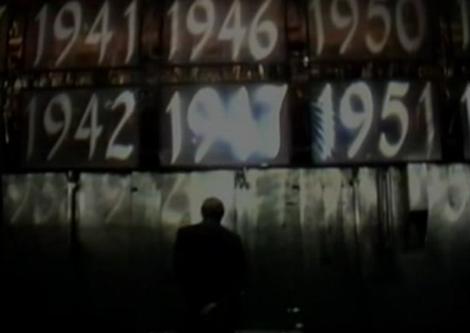
Peter Greenaway
Lumičre and Company
(1995)
ubu film
David Lynch
Peter Greenaway
Wim Wenders
Lumičre and Company (1995, original title "Lumičre et compagnie") was a collaboration between 41 international film directors in which each made a short film using the original Cinématographe camera invented by the Lumičre brothers.
Shorts were edited in-camera and abided by three rules:
A short may be no longer than 52 seconds
No synchronized sound
No more than three takes
_______________________
The Practice of Everyday Life
Michel de Certeau
Translated by Steven Rendall
google books
pdf available here
"To the ordinary man.
To a common hero, an ubiquitous character, walking in countless thousands on the streets. In invoking here at the outset of my narratives the absent figure who provides both their beginning and their necessity, I inquire into the desire whose impossible object he represents. What are we asking this oracle whose voice is almost indistinguishable from the rumble of history to license us, to authorize us to say, when we dedicate to him the writing that one formerly offered in praise of the gods or the inspiring muses?
This anonymous hero is very ancient. He is the murmuring voice of societies. In all ages, he comes before texts. He does not expect representations. He squats now at the center of our scientific stages. The floodlights have moved away from the actors who possess proper names and social blazons, turning first toward the chorus of secondary characters, then settling on the mass of the audience. The increasingly sociological and anthropological perspective of inquiry privileges the anonymous and the everyday in which zoom lenses cut out metonymic details-parts taken for the whole. Slowly the representatives that formerly symbolized families, groups, and orders disappear from the stage they dominated during the epoch of the name. We witness the advent of the number. It comes along with democracy, the large city, administrations, cybernetics. It is a flexible and continuous mass, woven tight like a fabric with neither rips nor darned patches, a multitude of quantified heroes who lose names and faces as they become the ciphered river of the streets, a mobile language of computations and rationalities that belong to no one."
_______________________
Lanthanum 9.4
Henry Gould
(....)
Cryptic groundskeep. Eld priest, old shaman...
medicine man. Henry Thunder Winnebago
croons in the prairie twilight... I’d go
there with you, Henry – shed my skin –
become that other Henry – Henry Lightfoot,
released from grief at last (& gravity
too). The shadow of a peacock’s wing... see?
Through an eye-rainbow... serpentine sky-root.
Inverted arc, smiling through rain. Swim
through the shiny pillar, shuddered Jiminy Hobo
parked on his iron rail. Toward absolute zero.
Yon Ojibwa wheel (Arowra Bury All-Ice). Dream.
...(more)
_______________________

Charles Marville
(1813 - c. 1879)
1 2 3 4
_______________________
Programmed Visions: Software and Memory
Wendy Hui Kyong Chun
(2011)
google bookspdf at Monoskop
(....)Although technologies, such as clocks and steam engines, have historically been used metaphorically to conceptualize our bodies and culture, software is unique in its status as metaphor for metaphor itself. As a universal imitator/machine, it encapsulates a logic of general substitutability: a logic of ordering and creative, animating disordering. Joseph Weizenbaum has argued that computers have become metaphors for all “ effective procedures, ” that is, for anything that can be solved in a prescribed number of steps, such as gene expression and clerical work.
The clarity offered by software as metaphor — and the empowerment allegedly offered to us who know software — however, should make us pause, because software also engenders a sense of profound ignorance. Software is extremely diffi cult to comprehend.Who really knows what lurks behind our smiling interfaces, behind the objects we click and manipulate? Who completely understands what one ’ s computer is actually doing at any given moment? Software as metaphor for metaphor troubles the usual functioning of metaphor, that is, the clarifi cation of an unknown concept through a known one. For, if software illuminates an unknown, it does so through an unknowable (software). This paradox — this drive to grasp what we do not know through what we do not entirely understand — this book argues, does not undermine, but rather grounds software ’ s appeal. Its combination of what can be seen and not seen, can be known and not known — its separation of interface from algorithm, of software from hardware — makes it a powerful metaphor for everything we believe is invisible yet generates visible effects, from genetics to the invisible hand of the market, from ideology to culture.
(....)
_______________________

Charles Marville
_______________________
The Jungle Line
Joni Mitchell
b. November 7, 1943
Rousseau walks on trumpet paths
Safaris to the heart of all that jazz
(....)
The jungle line, the jungle line
Screaming in a ritual of sound and time
Floating, drifting on the air-conditioned wind
And drooling for a taste of something smuggled in
Pretty women funneled through valves and smoke
Coy and bitchy, wild and fine
And charging elephants and chanting slaving boats
Charging, chanting down the jungle line
There's a poppy wreath on a soldier's tomb
There's a poppy snake in a dressing room
Poppy poison-poppy tourniquet
It slithers away on brass like mouthpiece spit
And metal skin and ivory birds
Go steaming up to Rousseau's vines
They go steaming up to Brooklyn Bridge
Steaming, steaming, steaming up the jungle line
_______________________
The disconnect between Washington and the rest of the nation hasn’t been this wide since the late 1960s.
The two worlds are on a collision course: Americans who are losing their jobs or their pay and can’t pay their bills are growing increasingly desperate. Washington insiders, deficit hawks, regressive Republicans, diffident Democrats, well-coiffed lobbyists, and the lobbyists’ wealthy patrons on Wall Street and in corporate suites haven’t a clue or couldn’t care less.
I can’t tell you when the collision will occur but I’d guess 2012.
-
Robert Reich
_______________________
The Class War Has Begun
And the very classlessness of our society makes the conflict more volatile, not less.
Frank Rich
_______________________
The Second Gilded Age
Has America Become an Oligarchy?
Thomas Schulz
_______________________
Who Shall Occupy Make Demands Of?:
The Modern Case of the One-Eyed Monster
Kenneth Bailey
(....)
So, why no demand? There’s no one within this sectoral collapse to legitimately make a demand of. Let’s not make demands to a collapsed privatized public sector. But we can start to pose the larger question. For those of us in the work of promoting social justice, we have to make this relational problem visible to the “99%” who are on the downside of it. To hold open a space of occupation without demands is to force us to recognize that underlying and feeding all the first order content problems is a more significant second order problem, to do with form and distance.
...(more)
Groundswell
A Journal of Art and Activism
_______________________

Lumičre and Company
Wim Wenders
(1995)
ubu film
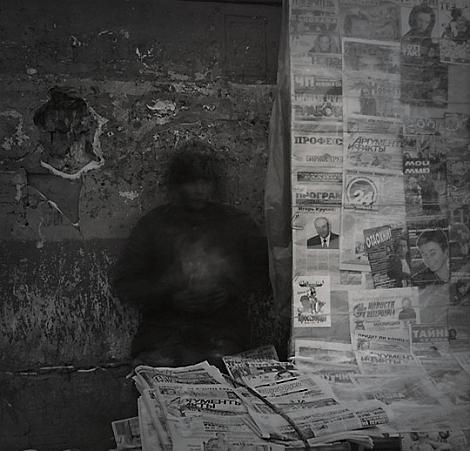
Time standing still
Alexey Titarenko
_______________________
That have not been asked:
ten dispatches about endurance in face of walls
John Berger
(....)
The poor have no residence. They have homes because they remember mothers or grandfathers or an aunt who brought them up. A residence is a fortress, not a story; it keeps the wild at bay. A residence needs walls. Nearly everyone among the poor dreams of a small residence, like dreaming of rest. However great the congestion, the poor live in the open, where they improvise, not residences, but places for themselves. These places are as much protagonists as their occupants; the places have their own lives to live and do not, like residences, wait on others. The poor live with the wind, with dampness, flying dust, silence, unbearable noise (sometimes with both; yes, that’s possible!) with ants, with large animals, with smells coming from the earth, rats, smoke, rain, vibrations from elsewhere, rumours, nightfall, and with each other. Between the inhabitants and these presences there are no clear marking lines. Inextricably confounded, they together make up the place’s life.
The poor are collectively unseizable. They are not only the majority on the planet, they are everywhere and the smallest event speaks of them. This is why the essential activity of the rich today is the building of walls – walls of concrete, of electronic surveillance, of missile barrages, minefields, frontier controls, and opaque media screens.
(....)
The secret of storytelling amongst the poor is the conviction that stories are told so that they may be listened to elsewhere, where somebody, or perhaps a legion of people, know better than the storyteller or the story’s protagonists, what life means. The powerful can’t tell stories: boasts are the opposite of stories, and any story however mild has to be fearless and the powerful today live nervously.
A story refers life to an alternative and more final judge who is far away. Maybe the judge is located in the future, or in the past that is still attentive, or maybe somewhere over the hill, where the day’s luck has changed (the poor have to refer often to bad or good luck) so that the last have become first.
Story-time (the time within a story) is not linear. The living and the dead meet as listeners and judges within this time, and the greater the number of listeners felt to be there, the more intimate the story becomes to each listener. Stories are one way of sharing the belief that justice is imminent. And for such a belief, children, women and men will fight at a given moment with astounding ferocity. This is why tyrants fear storytelling: all stories somehow refer to the story of their fall.
...(more)

John Berger
b. November 5, 1926
Ways of Seeing
John Berger
UbuWeb Film
_______________________
Revolutions in Reverse
Essays on Politics, Violence, Art, and Imagination
David Graeber
mediafire pdf
... what is the unifying theme?
It’s helpful, perhaps, to consider the context in which these essays were originally written. All of these essays were composed between 2004 and 2010. This was not an easy time for someone, like myself, actively engaged in social movements. Between roughly 1998 and 2002, the advent of the global justice movement had given all of us a sudden sense of almost endless possibility.The wake of 9/11 threw everything into disarray. For many it was impossible to maintain the sense of enthusiasm that had kept us so alive in the years before; many burned out, gave up, emigrated, bickered, killed themselves, applied to graduate school, or withdrew into various other sorts of morbid desperation. For me, the point where I came closest to despair was in the immediate wake of the 2004 US elections, when the originally stolen presidency of George W. Bush was actually given what seemed like a genuine popular mandate....
(....)
These essays then are the product of a confused interregnum. It was a time when it was very difficult to find signs of hope. If there is a single theme in this collection of essays, then, it is that they all start out from some aspect of the period that seems particularly bleak, depressing, what appeared to be some failure, stumbling block, countervailing force, foolishness of the global anticapitalist movement, and to try to recuperate something, some hidden aspect we usually don’t notice, some angle from which the same apparently desolate landscape might look entirely different. This is most obvious perhaps in the first three essays, all of which concern the lessons to be learned from the global justice movement; but it’s true, in one way or another, of all of them.
(....)
Are You An Anarchist? The Answer May Suprise You!David Graeber the Anarchist Library
via Disinformation
_______________________
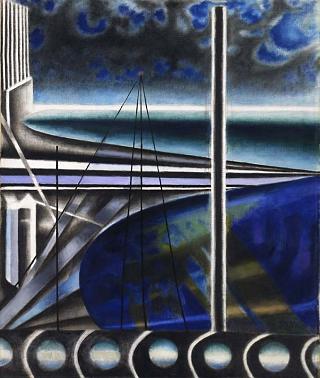
Metropolitan Port
1935-1937
Joseph Stella
June 13, 1877 - November 5, 1946
_______________________
The Metasociety
Stephen Downes
The OWS people are the social equivalent of somebody running through the halls clanging on a lid and yelling that the building is on fire. He doesn't want everyone else to start clanging lids, he wants them to get out of the building. It's not a question of how much people 'support' him, he's sounding the alarm. When he says 'we are in danger' he means not simply the 'we' who are clanging on lids, but everybody in the building.
(....)
OWS is, at its heart, a change in the way we view social change and political action. It's a recognition that the placement of too much of anything - power, money, influence - into the hands of a few is ultimately damaging to society. It's an attempt to create enough social friction to make the accumulation of so much wealth and power unbearable to the few who possess it. And its an attempt to understand how we govern ourselves in the coming era after we have rejected the attempts of the rich and powerful to do our governing for us....(more)
_______________________
The Myth of the Rational Market:
A History of Risk, Reward, and Delusion on Wall Street
Justin Fox
(2009)
google books
_______________________
For a Freudo-Marxist Critique of Social Domination:
Rediscovering Erich Fromm Through the Mirror of Pierre Bourdieu
Leonidas K. Cheliotis
_______________________
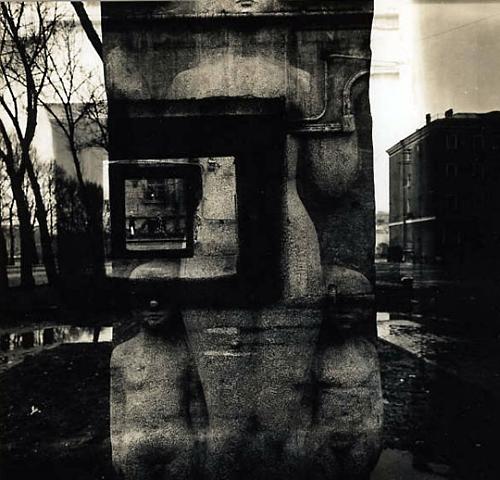
nomenklatura of signs
Alexey Titarenko
_______________________
An estimated 650,000 consumers have closed their bank accounts and opted for credit union membership over the past four weeks, according to CUNA, bringing the approach to Saturday’s Bank Transfer Day to a crescendo.
American Banker
Bank Transfer Day: 5 tips for a smooth transition
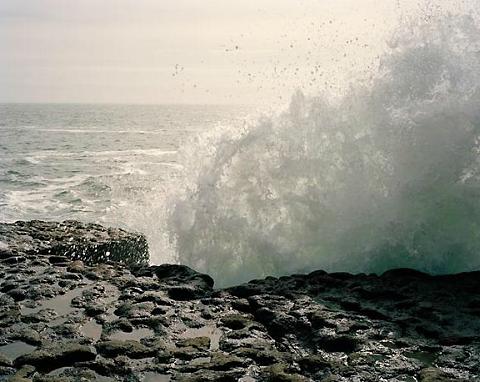
The Dorset Coast
Jason Bascombe
_______________________
Sea-Map
Hilda Morley
Taste of salt on my fingers,
that’s how
I like it:
the line of sea rising
above the dark-green pine,
the sea meeting
the horizon,
so always the eyes are lifted higher,
the pulse buoyed upward
with them
So it
should be for us all—
to belong to
whatever moves us outward into
the wideness, for journeying,
tales of
distant places,
treasures piled
to fill our smiling,
for us to know of
along the travelled coastline,
the mountains
we can climb to,
each port,
each harbor
another window to wash our faces in,
pull us
forward
& made for us, made for
all of us,
as the birds know, who
fly the continents, the oceans
for their secret reasons,
a map of the earth
written inside their bodies,
marked
under their breastbones:
a continuance
of the now most fragile,
always travelled
patiently enduring world

Hilda Morley
1916 - 1998
Preface: For Hilda
Robert Creeley
Whatever poetry is or will ever be, these miraculous traceries of mind and heart bring you here in such vivid clarity--as though the door suddenly opened and there were a bright flash of sun and the lingering odor of fresh rain and dampened earth. One thinks of all the rules there have been, of the characteristic male proscriptions one had thought to learn and attend, as if the art of saying things, a "how to dance sitting down," were only some lesson to be mastered. You must well remember the days of the "poeme bien fait" when we marched off to that drear school of previous habits, hoping that something we found might fit although it didn't. I wonder at the way you taught yourself then to move with such lightness and particularity, touching each term and thing, each feeling, always making them actual -- like Denise saying (quoting Jung), "Everything that acts is actual." You made remarkable sense of it....(more)
Perhaps
Hilda Morley
Perhaps it is time, I thought,
having read Milosz
speaking of the length of his life, its phases
(and I not so very much younger than he) to begin to
think of myself as long-lived,
a long life behind me
perhaps it is time for that & I have been
shirking it, frightened
at the length of time behind me,
the many lives,
differing kinds of loves,
roads & landscapes, cities,
rooms, stairways—phases of
youth, gropings, fears, wishes, often
barely known—ignorance
of what to hold to, encounters
almost fateful
& so many searchings,
wanderings alone.
But eighteen hours now, the company
of new & loving friends & all this
does not matter.
A blue-green sea, frothing,
white anger on the rocks, a vulture
overhead, wild mustard in the fields.
The junco-sparrows
reddish-backed peck at
whatever seeds, worms, alert,
dispersing
to keep their distance from me on the fence-rails
when I move.
...(more)
_______________________

The British Watershed Line
Jason Bascombe
_______________________
New Philanthropy in conservative times
Rick Salutin
(....)
What was bad in the old version of charity was that it reinforced the sense of distance and difference between givers and givees. What was good about it is that it injected an element into public activity not tied to the dominant economic system through the profit motive; the old charity was predicated instead on fellow feeling, human solidarity and even, gulp, love. The New Philanthropy, which is basically even older than the old kind, reintroduces an appeal to narrow self-interest in the form of greed, a jacked-up component of control, and narcissism in the form of fawning media reflections. ...(more)
_______________________
The Occupy Poetry Project

photo - mw
_______________________
The Museum of Stones
Carolyn Forché
This is your museum of stones, assembled in matchbox and tin,
collected from roadside, culvert, and viaduct,
battlefield, threshing floor, basilica, abattoir,
stones loosened by tanks in the streets
of a city whose earliest map was drawn in ink on linen,
schoolyard stones in the hand of a corpse,
pebble from Apollinaire’s oui,
stone of the mind within us
carried from one silence to another,
stone of cromlech and cairn, schist and shale, hornblende,
agate, marble, millstones, and ruins of choirs and shipyards,
chalk, marl, and mudstone from temples and tombs,
stone from the silvery grass near the scaffold,
stone from the tunnel lined with bones,
lava of the city’s entombment,
chipped from lighthouse, cell wall, scriptorium,
paving stones from the hands of those who rose against the army,
stones where the bells had fallen, where the bridges were blown,
those that had flown through windows and weighted petitions,
feldspar, rose quartz, slate, blueschist, gneiss, and chert,
fragments of an abbey at dusk, sandstone toe
of a Buddha mortared at Bamiyan,
stone from the hill of three crosses and a crypt,
from a chimney where storks cried like human children,
stones newly fallen from stars, a stillness of stones, a heart,
altar and boundary stone, marker and vessel, first cast, lode, and hail,
bridge stones and others to pave and shut up with,
stone apple, stone basil, beech, berry, stone brake,
stone bramble, stone fern, lichen, liverwort, pippin, and root,
concretion of the body, as blind as cold as deaf,
all earth a quarry, all life a labor, stone-faced, stone-drunk
with hope that this assemblage, taken together, would become
a shrine or holy place, an ossuary, immovable and sacred,
like the stone that marked the path of the sun as it entered the human dawn.
Carolyn Forché at the Poetry Foundation
_______________________
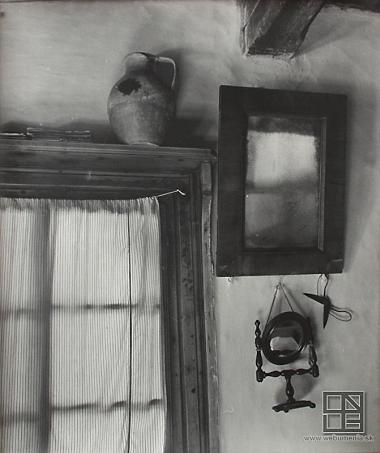
Martin Martinček
via A la recherche du temps perdu
_______________________
TWO LINES Online: November 2011Tu, felix Austri
Tomas Venclova
Translated by Rimas Uzgiris
In this city
which grew bitter saving people,
where so many neurotics were healed
in offices
where slippery dreams were
coaxed from the couch,
aging Europe's unloved
son thought of death:
such was its fate when he was not
accepted into the artists' estate,—
the whirlpool in the water
bends the boat, and the shore sways
under a double chain of chestnuts.
In a cafe, the congenital coughing
of rock and roll, no ruins, but the baroque
tilting a balcony
stuck with a star
bearing witness to the country's haughtiness.
Rhythm darkens consciousness. ...
...(more)
Poems by Tomas Venclova
_______________________
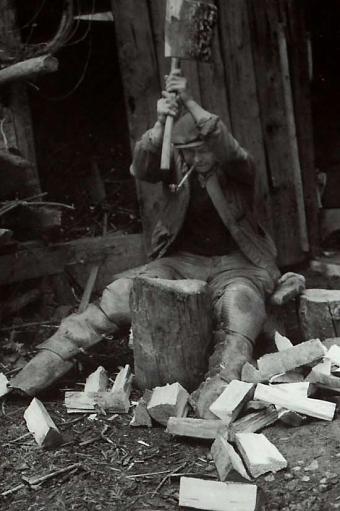
Martin Martinček
_______________________
Blame Canada!
How our unassuming neighbor to the north became a rapacious behemoth run amok
Andrew Nikiforuk
_______________________
Debt, Slavery and our Idea of Freedom Part 1 Part 2
David Graeber interviewed
_______________________
Truthtelling: Democracy in an Age Without Facts
Roger Berkowitz
Arendt Center
We face today a crisis of fact. Facts, as Hannah Arendt saw, are all around us being reduced to opinions; and opinions masquerade as facts. As fact and opinion blur together, the very idea of factual truth falls away. And increasingly the belief in and aspiration for factual truth is being expunged from political argument. Even before technologists have made good on their promises to provide virtual realities, we have created multiple realities using nothing more than the internet, cable news, and human nature.
The Hannah Arendt Center for Politics and the Humanities
_______________________

Tay river beside the house
Perth Library in background
photo - mw
_______________________
The Natural Look
Marjorie Perloff on the 50th anniversary of John Cage’s Silence
Los Angeles Review of Books
(....)
Fifty years later, and almost two decades after Cage’s death, we know very well that he did not let life “act of its own accord.” There is, to the contrary, a distinctively Cagean musical sound (now known primarily from recordings), just as Cage’s essays, lectures, and poetic texts are immediately recognizable as no one else’s. Aesthetic arguments and aphorisms, as he conceived of them, are not philosophical nuggets to be taken as essential truths, but provocations designed to force people to think. (After all, most of his “theorems” are formulated as questions; Part III of “Composition as Process” for example, has 11 pages of them.)
As for the little Zen stories scattered throughout Silence, they no longer strike me as sunny and serene; on the contrary, some are downright sinister. And the book’s structure, which I once took to be intentionally anarchic — its parts presented in no particular order — now impresses me by its careful construction. To say Silence was ahead of its time is thus not quite right: more properly speaking, Cage’s mix of manifesto and commonplace book, typographical experiment and tall tale, diary and aesthetic theory, is one that perpetually confounds its time — whatever the time may be that you happen to pick it up....(more)
_______________________
UbuWeb Top Sixteen
November 2011
Selected by Los Angeles Free Music Society
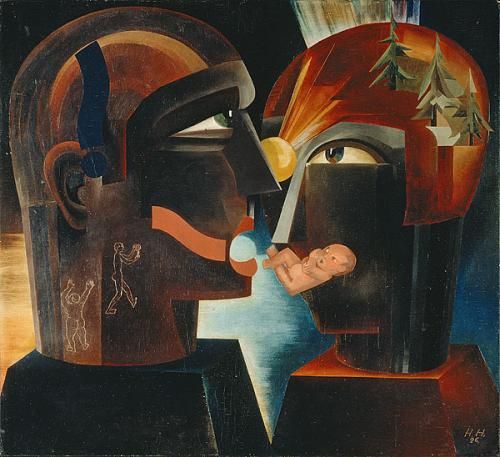
Imaginary bridge
Hannah Höch
(November 1, 1889 - May 31, 1978)
_______________________
Spaces of hope
David Harvey
google books
The paradoxes I have described relate to a massive discursive shift that has occurred over the past three decades. There are all kinds of aspects to this shift and it is easy to get lost in a mass of intricacies and complexities. But what is now striking is the dominance of an almost fairy-tale like belief, held on all sides alike, that once upon a time there was structuralism, modernism, industrialism, Marxism or what have you and now there is post-structuralism, postmodernism, postindustrialism, post- Marxism, post-colonialism, and so forth. Like all such tales, this one is rarely spoken of in such a crude or simplistic way. To do so would be particularly embarrassing to those who deny in principle the significance of broad-based ‘metanarratives.’ Yet the prevalence of‘the post’ (and the associated inability to say what it is that we might be ‘pre’) is a dominant characteristic of contemporary debate. It has also become a serious game in academia to hunt the covert modernists (if you are a dedicated postmodernist) or to hunt the decadent postmodernists (if you happen to be in favor of some sort of modernist revival).
One of the consequences of this prevalent fairy tale (and I call it that to capture its beguiling power) is that it is impossible to discuss Marx or Marxism outside of these dominant terms of debate. ... Put bluntly, we do not read Marx these days (no matter whether he is relevant or not) because he is someone whose work lies in a category that we are supposed to be ‘post’. Or if we do read him, it is solely through the lenses provided by what it is we believe we are ‘post.’
Spaces of Hope
David Harvey ucpress
mediafire pdf
_______________________

Fort Chipewyan lives in the shadow of Alberta’s oil sands
Photo Essay by Ian Willms
this magazine
Canada’s oil sands are the largest and most environmentally destructive industrial project in the world. So far, oil sands development has eliminated 602 square kilometers of Boreal forest and emits 29.5 million tonnes of greenhouse gasses annually. The process involves strip-mining bitumen, a tar-like, sandy earth also known as “tar sands,” then processing it into various petroleum products. This process produces 1.8 billion litres of liquid toxic waste every day, which is stored in man-made “tailings ponds.” These ponds currently hold enough toxic waste to fill 2.2 million Olympic-sized swimming pools.
The First Nations community of Fort Chipewyan is located 300 kilometres downstream from the oil sands....(more)
_______________________
Words without Borders
November 2011: Writing from the Caribbean
There is No Theorem (A Regguetón)
Omar Pérez
Translated from Spanish by Kristin Dykstra
There is no theorem
just the combination
10,000 years of going with digressions:
I write regguetones, forget the variation.
There is no theorem
from the mist itself
the primates descend in search of phonemes
can create regguetones
and invite the system.
There is no theorem
with the mist itself
the songs the poems
sing themselves
everything I hear seems to be a slogan
to be or not to be, I think therefore I am
god loves you, and if the fish don’t bite?
Just paddle
all things in moderation and the moderation addles.
There is no theorem
the ocean mist itself
puts surf into the philosopheme:
syntagma of granite
conceive of your problem
as a single law stained infinite
that says what it says
and what it says, is flame.
_______________________

Torbjųrn Rųdland Torbjųrn Rųdland
in conversation with Shane Lavalette
_______________________
Illuminations
review essay on new photography books
Brian Dillon
What mode or degree of attention does photography demand, or deserve, today? It sometimes seems the photograph as such is no longer really with us: suborned to contemporary art practices for which mediumistic integrity is beside the point, dispersed in myriad online quotidia that flummox efforts at a cult-studs overview, the medium meanwhile a decade and more past its heyday as gallery-bound pretender to painting’s spectacle and presence. And yet criticism carries on much as if photography were still parsable in terms of the old problems. Traditional photographic publishing does its sedulous, Aperture-approved thing; academic treatments abound of this or that (dread word ahead) ‘issue’ as pertains to photographic history; and a certain three-decades-old ‘theoretical’ text (no prizes) simply will not go away. Surveying recent photographic publications is an oddly familiar exercise – mostly one just longs for evidence of real looking....(more)
_______________________
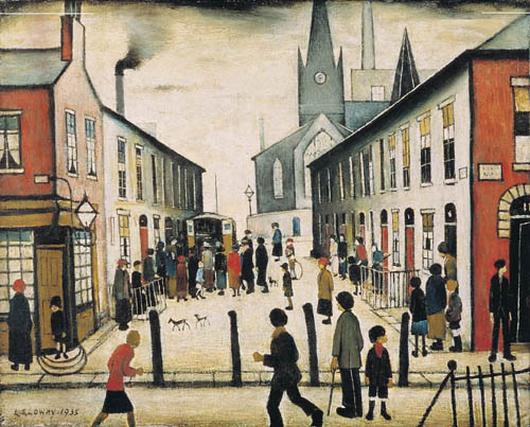
The Fever Van
1935
Laurence S. Lowry
b. Nov. 1, 1887
_______________________
Otoliths
Issue twenty-three November 1, 2011
Editor: Mark Young
Analyzed Depictions
Felino A. Soriano
otoliths
1
“Everything is discursive opinion instead of direct experience.”
A. R. Ammons
Dianoetic module (mind-modulation), modal-learned timber of the persistent
range
an alphabet’s copacetic encouragement, affirmed.
Speech
withdraws abstract finality, gait of winged wobble
whereabouts determined of the mind’s frigid understanding.
Held in hand’s cave of common dexterity; promised as growth
encapsulates holism’s radial interrelation. Gauge of roaming intellect, gauged
ponder excavates innuendo
syncopated
revelations into thought’s ending among logic’s anecdotal
didacticses.
...(more)
_______________________

photo - mw
_______________________
Ten Years Later:
Surveillance in the "Homeland"
A joint project between Truthout.org and ACLU
_______________________
an excerpt from Top Secret America: The Rise of the New American Security State by Dana Priest and William M Arkin
(....)
The scene of Joy Whiteman holding herself up with the walls of the body scanner while a crew of security guards, paid by taxpayers, made sure she didn’t fall, seemed a perfect metaphor for what has transpired in the United States over the past ten years. Having been given a steady diet of vague but terrifying information from national security officials about the possibility of dirty bombs, chemical weapons, biotoxins, exploding airliners, and suicide bombers, a nation of men and women like the Whitemans have shelled out hundreds of billions dollars to turn the machine of government over to defeating terrorism without ever really questioning what they were getting for their money. And even if they did want an answer to that question, they would not be given one, both because those same officials have decided it would gravely harm national security to share such classified information— and because the officials themselves don’t actually know.(....) ...(more)
|

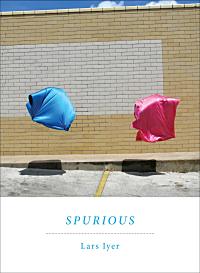


 The Age of Briggs & Stratton
The Age of Briggs & Stratton













































